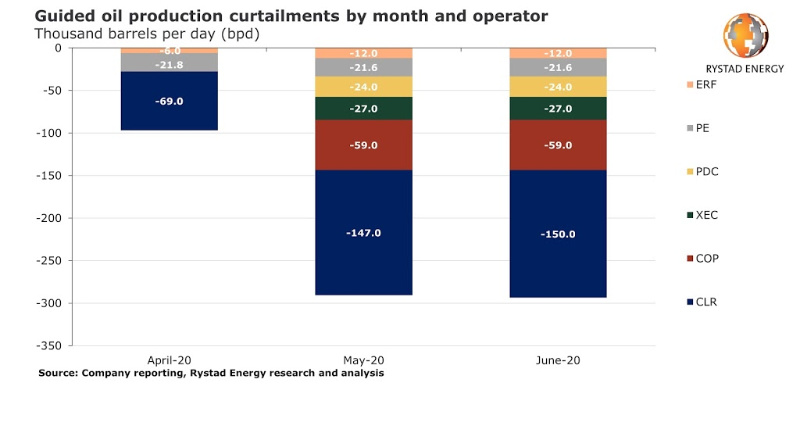Analysts at Rystad Energy said April 28 at least 300,000 barrels per day (bbl/d) of U.S. oil production will be shut in during May and June with low oil prices likely to force more production offline.
The outlook, which is up from about 100,000 bbl/d in projected cuts for April, was based on early communication from U.S. oil producers, including Continental Resources, Cimarex Energy, ConocoPhillips, PDC Energy, Parsley Energy and Enerplus Corp.

Though cuts will be spread across the Lower 48, Williston Basin is expected to be impacted the most, according to Veronika Akulinitseva, vice president of North American shale and upstream for Rystad Energy.
“The Bakken play accounts for a high share of combined output, closely followed by Permian Delaware,” Akulinitseva said in a news release. “Yet given the single-digit wellhead prices seen in the region recently, and overall commerciality, the shut-ins in Bakken are likely to be more pronounced.”
Analysts said they believe shale producers will try to deliver the cuts mainly by lowering the number of new wells put into production with base decline making up a “material portion of the reported cut.”
However, “given typical shale operational patterns, the decline in started jobs that began in March will result in a lower number of wells put on production in May, which ultimately will not lead to a drop in peak production until June,” Rystad said.
Recommended Reading
Guyana’s Stabroek Boosts Production as Chevron Watches, Waits
2024-04-25 - Chevron Corp.’s planned $53 billion acquisition of Hess Corp. could potentially close in 2025, but in the meantime, the California-based energy giant is in a “read only” mode as an Exxon Mobil-led consortium boosts Guyana production.
US Interior Department Releases Offshore Wind Lease Schedule
2024-04-24 - The U.S. Interior Department’s schedule includes up to a dozen lease sales through 2028 for offshore wind, compared to three for oil and gas lease sales through 2029.
Utah’s Ute Tribe Demands FTC Allow XCL-Altamont Deal
2024-04-24 - More than 90% of the Utah Ute tribe’s income is from energy development on its 4.5-million-acre reservation and the tribe says XCL Resources’ bid to buy Altamont Energy shouldn’t be blocked.
Mexico Presidential Hopeful Sheinbaum Emphasizes Energy Sovereignty
2024-04-24 - Claudia Sheinbaum, vying to becoming Mexico’s next president this summer, says she isn’t in favor of an absolute privatization of the energy sector but she isn’t against private investments either.
Venture Global Gets FERC Nod to Process Gas for LNG
2024-04-23 - Venture Global’s massive export terminal will change natural gas flows across the Gulf of Mexico but its Plaquemines LNG export terminal may still be years away from delivering LNG to long-term customers.





